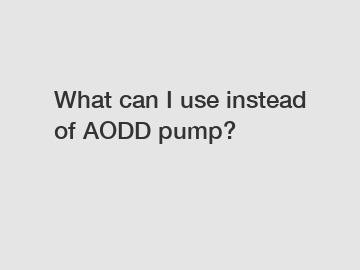What can I use instead of AODD pump?
Fluid transfer plays a crucial role in numerous industries, ranging from chemical processing and wastewater treatment to food and beverage production. Traditionally, Air-Operated Double Diaphragm (AODD) pumps have been the go-to solution for these applications. However, with the advent of technology and evolving demands for efficiency, reliability, and cost-effectiveness, alternative pumping solutions have emerged. In this article, we will delve into some remarkable alternatives to AODD pumps that are increasingly gaining favor in the fluid transfer landscape.
1. Centrifugal Pumps:
Centrifugal pumps have become a popular choice for fluid transfer due to their energy efficiency and smooth operation. These devices utilize a rotating impeller to convert mechanical energy into fluid velocity, effectively transferring liquids with minimal pulsation and shear. Centrifugal pumps offer a wide range of flow rates and pressures, making them versatile for various industries. Moreover, their low maintenance requirements and ability to handle high-viscosity fluids make them an excellent choice for many applications.

2. Peristaltic Pumps:
Peristaltic pumps, also known as hose pumps, offer an innovative solution for gentle fluid transfer and precise metering applications. These pumps employ rotating rollers or shoes to compress a flexible hose, allowing fluids to be transported without any contact between the pump and the fluid. This feature makes them ideal for transferring shear-sensitive or aggressive fluids. Peristaltic pumps are highly reliable, require minimal maintenance, and offer excellent accuracy, making them suitable for pharmaceutical, biotech, and laboratory settings.
3. Magnetic Drive Pumps:
In environments where leak-free operation is critical, magnetic drive pumps provide an efficient and reliable solution. These pumps use a magnetic coupling to drive the impeller, eliminating the need for a traditional shaft seal. As a result, the risk of leaks and cross-contamination is greatly reduced. Magnetic drive pumps are often favored in chemical processing, oil and gas, and water treatment industries due to their ability to handle corrosive and hazardous fluids without compromising safety or performance.
4. Progressive Cavity Pumps:
Progressive Cavity (PC) pumps, also known as helical rotor pumps, employ a unique design that facilitates the efficient transfer of highly viscous fluids or those containing abrasive particles. These pumps consist of a helical rotor and a stator, creating a series of sealed cavities that gently push the fluid through the pump. Their ability to operate at low pulsation and shear makes them ideal for applications such as transferring sludge, oils, and slurries. PC pumps offer excellent suction capabilities and can run dry without causing damage, making them highly reliable and cost-effective.
Conclusion:
While Air-Operated Double Diaphragm (AODD) pumps have long been the industry standard for fluid transfer, it is essential to explore and adopt newer alternatives to meet evolving demands. Centrifugal pumps, peristaltic pumps, magnetic drive pumps, and progressive cavity pumps offer enhanced efficiency, reliability, and cost-effectiveness, catering to a wide range of applications and fluid transfer requirements. As technology advances, it becomes imperative for industries to embrace these alternatives and harness the benefits they offer to optimize their operations and elevate productivity.
If you want to learn more, please visit our website Pneumatic Piston Pump, pneumatic powder pump, Pneumatic Piston Pump.
345
0
0


Comments
All Comments (0)